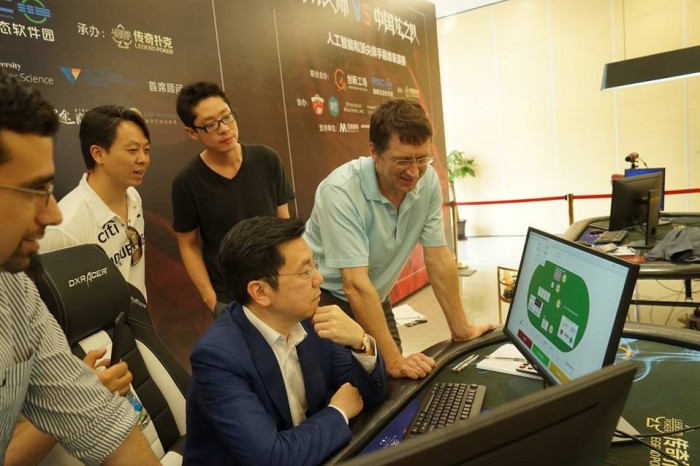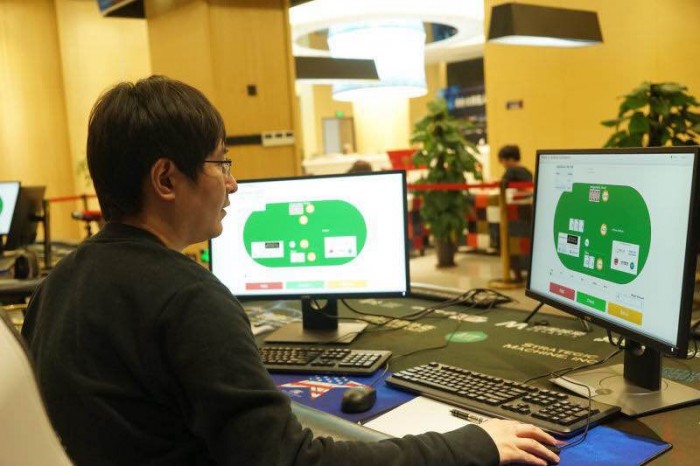A Top Poker-Playing Algorithm Is Cleaning Up in China

The world’s most advanced poker bot just trounced all comers at a tournament last weekend in Hainan, an island province in southern China.
A previous version of the bot defeated several top professional players in a tournament held at a Pittsburgh casino over several weeks this January. Called Libratus, it was developed by Tuomas Sandholm, a professor at Carnegie Mellon University who specializes in machine learning and game theory, along with one of his students, Noam Brown.
The feat was significant because poker is fundamentally different from the types of games AI researchers have tackled previously. Because an opponent’s cards are hidden from view, playing well requires extremely complex strategizing (see “Why Poker Is a Big Deal for Artificial Intelligence”).
A new and improved version of the CMU bot—called Lengpudashi, which means “cold poker master” in Chinese—defeated a team made up of poker-playing AI researchers at the Hainan event. Entrants played a total of 36,000 hands against the program, which runs on a supercomputer located near CMU in Pittsburgh.
The event was organized by Sinovation Ventures, an incubator and venture firm, partly to draw public attention to artificial intelligence but also to explore ways of commercializing the underlying technology, says Kai-Fu Lee, the firm’s CEO.
“We want to wake people up by showing how Libratus and AlphaGo are exceeding human expectations in terms of intelligence,” Lee says.
Lee says there are huge opportunities for Chinese companies to employ AI techniques because their systems are often relatively unsophisticated. He adds that China has a good chance to take a lead in AI because it has many skilled engineers and a wealth of data for training advanced algorithms.

Lee also thinks the game theory techniques used to make CMU’s poker-playing program have big potential in areas like trading and automated negotiations.
“Poker is an imperfect-information application, as are most real-world applications,” Lee says. “Demonstrating that machines can beat the best humans indicates there will be many applications.”
Smarter poker-playing algorithms are just one example of AI that can take on humans in games. Around the same time that CMU’s poker bot won in Pittsburgh, another research team, made up of academics from Canada and the Czech Republic, developed a poker-playing algorithm that also defeated several professional players. And last year, researchers at DeepMind, a U.K.-based subsidiary of Google’s parent company, Alphabet, developed a program capable of playing the board game Go at an expert level. In a widely followed game, this program, called AlphaGo, defeated one of the best Go players in the world, Lee Sedol of South Korea.
The poker competition in Hainan is just the latest example of AI technology making its way to China. DeepMind recently announced that it will take AlphaGo to a summit involving top Chinese Go players in Wuzhen, near Shanghai. The event will involve pairing human players with AlphaGo to explore opportunities for collaborative play. The DeepMind program will also take on the world’s number one Go player, China’s Ke Jie.
Meanwhile, AI researchers based in China are making strides as they seek to match the progress of big U.S. tech companies.
Researchers at Alibaba, one of China’s leading Internet companies, recently published details of an impressive AI algorithm for playing the popular strategy computer game Starcraft. In collaboration with researchers at University College London in the U.K., the Chinese researchers show how several agents working together can devise surprisingly complex, high-level behavior.
Keep Reading
Most Popular
Large language models can do jaw-dropping things. But nobody knows exactly why.
And that's a problem. Figuring it out is one of the biggest scientific puzzles of our time and a crucial step towards controlling more powerful future models.
How scientists traced a mysterious covid case back to six toilets
When wastewater surveillance turns into a hunt for a single infected individual, the ethics get tricky.
The problem with plug-in hybrids? Their drivers.
Plug-in hybrids are often sold as a transition to EVs, but new data from Europe shows we’re still underestimating the emissions they produce.
Stay connected
Get the latest updates from
MIT Technology Review
Discover special offers, top stories, upcoming events, and more.